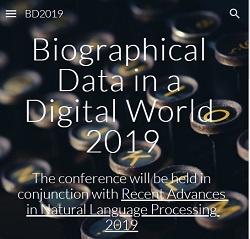First Call for Papers: BIOGRAPHICAL DATA in a Digital World 2019
14/11/2018


First Call for Papers Biographical Data in a Digital World 2019, Varna (Bulgaria), 5-6 September 2019. The conference will be held in conjunction with Recent Advances in Natural Language Processing 2019.
iMPORTANT DATES:
- Deadline for full paper submissions: 15 May 2019, 08:00 GMT.
- Deadline for abstracts: 21 June 2019, 08:00 GMT.
- Notification of acceptance: 1 July 2019, 08:00 GMT.
- Conference dates: 5-6 September 2019, Varna, Bulgaria
- Camera ready version: 12 September 2019, 08:00 GMT.
This conference:
- Explores whether and how, in the field of digital humanities, BIOGRAPHICAL DATA are special...
Biographies are interesting for analysis with computer techniques, since individuals share a set of common characteristics that can be relatively easily identified by a machine, such as a birthdate, a partner, a profession, and a network. Tools and approaches from the digital humanities can be used for both quantitative analyses of such data and for providing leads for more qualitative research questions.
- Aims at bringing together researchers from both the humanities and the computer sciences to exchange experiences, methods and practices with respect to ICT mediated quantitative and qualitative analysis of biographical data.
|
What can we do already with computational methods with the huge amount of digital biographical data that is available? What will we be able to do in the future?
What will we not be able to do? |
For this edition both full paper submissions and abstracts are invited
Papers must have a maximum of 8.000 words (excluding bibliography and footnotes) and minimum of 3000 words, which will undergo a single blind peer review process. Accepted papers will be published in online proceedings shortly after the Conference.
Abstracts will be checked for relevance. Accepted abstracts will be welcome to give a presentation at the Conference, and will be included in a book of abstracts.
Topics which may be addressed include, but certainly are not limited to:
1. Mining biographies for structured information
2. Biographies and linked data
3. Using biographical information for quantitative analyses
4. The canonization of people and events in history
5. The use or uselessness of big data for biographical research
6. Visualizing biographical data
7. Biographical Dictionaries
8. Dealing with biographical data in heterogeneous datasets
9. Practices in digitizing and converting biographical data to a software interpretable format
10. Automatic biography generation
11. Biographies across countries and cultures
12. Standards, vocabularies and best practices for the encoding and processing of biographical data
Source: BD2019
.jpg)
Related:
Call for papers: DATA JOURNAL Special Issue on “Semantics in the Deep: Semantic Analytics for Big Data" (Submission deadline: 23 November 2018)
Meaningful Bibliographic Metadata (M2B)
Data, Big data and Database Semantics (entry in ISKO Encyclopedia, 2018)
Platform for Big Data in Agriculture : to Organize, Convene, Inspire
Find Linked Datasets of your interest with LODAtlas
Introduction to Text and Data Mining: a free 6 hour online course (from FOSTER & OpenMinTeD projects)
METADATA 2020: details and crosswalks of the recommendations. Can we agree?
SOMMERLAND, Ylva (2016) Accessing National Bibliographic Data in Visual Dialog with Biographic Data. Paper presented at: IFLA WLIC 2016 – Columbus, OH – Connections. Collaboration. Community in Session 210 - Bibliography.
.jpg)
To keep up-to-date with AIMS news, Sign up for AIMS News, follow @AIMS_Community on Twitter.
And, thanks again for your interest !
